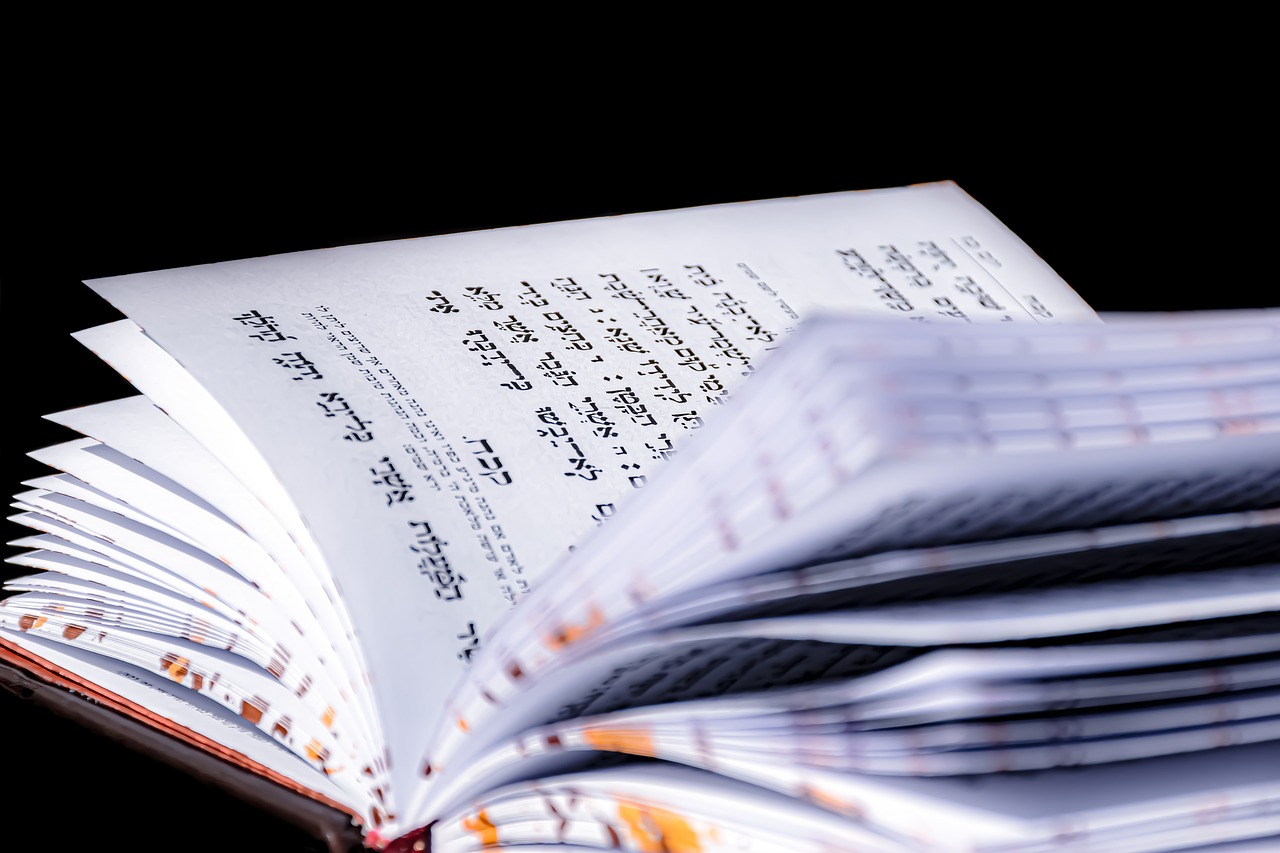September 28, 2022|ג' תשרי ה' אלפים תשפ"ג Nitzavim 5782 - The Freedom That Comes From Balance
Print Article
A number of years ago, Dr. Pelcovitz was a scholar in Residence in a community, and the Rav of the large shul told Dr. Pelcovitz a story that happened over Pesach with his daughter:
“My oldest daughter is 19, and she was intent on stealing the afikomen. And I was disappointed because I felt she is too old for this and should be allowing the younger kids to do it. I was really very annoyed with her. But she persisted, and she was intent on making this happen.
“Eventually, the time came, she was able to steal it, and reluctantly I came to her and said ok, Rachel, what would you like for successfully stealing the afikomen?
“And she says to me, ‘OK Abba, here’s what I want: After Pesach, I want you and me to go out, just the two of us for dinner. There’s only one caveat, you have to leave your cell phone at home.’
“It was a big mussar for me. That was what it took for my 19 year-old to be able to get through to me! And rather than doing it once, I made it a weekly ritual, every Wednesday night we go out for dinner or take a walk, and I leave my phone at home.”
As we sit in shul, just two days before Rosh Hashana, I always find it remarkable how Parshas Nitzavim always offers so many lessons which are relevant to the Yamim Noraim.
One such lesson comes as Moshe encourages the people about the opportunities that exist for success with a particular Mitzvah:
כִּי הַמִּצְוָה הַזֹּאת אֲשֶׁר אָנֹכִי מְצַוְּךָ הַיּוֹם לֹא נִפְלֵאת הִוא מִמְּךָ וְלֹא רְחֹקָה הִוא:
This Mitzvah, says Moshe, isn’t too far away from you.
לֹא בַשָּׁמַיִם הִוא...וְלֹא מֵעֵבֶר לַיָּם הִוא.... כִּי קָרוֹב אֵלֶיךָ הַדָּבָר מְאֹד בְּפִיךָ וּבִלְבָבְךָ לַעֲשֹׂתוֹ: ס
It’s not in heaven, it’s not across the ocean. Rather, it’s very close for you. Something that you can really accomplish!
The Binas Yisrael, a sefer written by Rabbi Yisroel Szapira of Grodzhisk, the brother of the Piacezna rebbe, asks a question:
What do you mean mitzvos aren’t BaShamayim or Across the ocean!? Some mitzvos are really hard!
And he answers that what Moshe Rabbeinu is teaching us an important lesson in growth.
Sometimes, we become so interested in doing mitzvos, in accomplishments that feel big and really impactful, that we ignore the simple ones right in front of us.
For example, they don’t want to give a small donation to a poor individual on the street, we want to wait to collect a large sum, so we can sponsor a scholarship at a yeshiva!
We want to do things that will be noticed in Shamayim! And that’s nice and wonderful, but if we do that, then who will take care of the simple chasadim, the small acts of kindness we can do for so many people every minute of the day?
If we spend too much time in Shamayim, too much time looking Mei’Ever LaYam, then we may never tend to the mitzvos that are KAROV ELEICHA, the mitzvos that are sitting right in front of us, waiting for us each and every day.
You have hopefully been seeing over the past few weeks the beginning of a conversation. A conversation that is just starting to take place within our community about the need to find balance in the way we use technology in our lives.
And I’m so proud of this initiative because it is a chance for us to talk about an element of our lives that has become so natural, so automatic, that we don’t typically take a step back to consider the impact it is having on us and on our children.
It’s an issue that on the one hand feels like it’s Bashamayim & Me’Eiver LaYam. It’s so big, so challenging. But it’s also something that is Karov Eilecha HaDavar Me’od. It is an issue that confronts us daily, and one, I believe, that we can do something about.
Every tool that enters the world provides us simultaneously with an opportunity and a challenge. And there may be no greater example, than the Smart Phone.
Of course, the smart phone has brought us incredible value. We can access our emails, phone calls, texts, get directions, and a million other tasks without the need to sit in front of a computer. Thousands of people listen to millions of ours of shiurim in their car, and on the train or bus. People have reconnected with long-lost relatives, kidney donors are matched with recipients, and the list goes on…
And yet, I don’t have to tell you about the negative impacts of the Smart Phone, but I will…
Have you ever heard of “Phubbing”? Phubbing someone is to snub a person you are speaking to by checking your phone. So, a PHUB is a PHONE-SNUB.
Time magazine ran an article a few years ago about the impact that picking up one’s phone while in the middle of a conversation has on the people having the conversation:
Several studies have shown that phubbing makes face-to-face interactions less enjoyable and meaningful for both parties.
A study published in the Journal of Social and Personal Relationships found that the mere presence of a cell phone during a conversation — even if no one was using it — was enough to make people feel less connected to each other.
Phubbing has been associated with lower marital satisfaction for both spouses, and, of course, probably those who are impacted the most by “phubbing” are our children. When our children feel that they can’t get our attention because we are too busy with an email, a text, or anything else, they may wait for the first few seconds, but then they’ll go find something else that will give them that attention…and oftentimes, it’s their own device.
And then there’s the impact on our own mental health:
The constant pings from our phones have been associated with higher levels of cortisol, the hormone released in moments of stress. And the more we expose ourselves to the constant pull on our attention, the more our anxiety levels rise. In fact, researchers have found that your cortisol levels are elevated even when your phone is just in sight or nearby, or when you hear it or even think you hear it!
But there is good news.
Researchers has shown that creating a healthier balance with how we use our phones can help improve our relationships and help to balance our neurochemistry as well.
When people block off specific, regular times when they won’t be checking their phone, their cortisol levels drop and they feel less stress not only during the breaks but also overall.
Research out of Columbia University has found that children who have dinner with their family on a regular basis – without phones – are 50% less likely to abuse drugs and alcohol.
Why? The children themselves reported that they were more likely to feel connected to their parents and to be willing to confide in them.
These are but a few of the reasons my colleagues and I decided to spend the month of Elul focused on this initiative, as the potential benefits to individuals and families are enormous.
But I’ll tell you, as I was involved in promoting this initiative over the past few weeks, I realized it was time to try this out for myself. My smartphone is a critical element of everything I do during my day. It’s my home office on the go, as I’m sure it is for many of you. So, I too, have had a lot of trouble finding a way to disconnect when I come home.
So, two weeks ago, Chani & I decided to set one hour each evening when the kids get home, to put our phones away. No checking at all. And I have to tell you, it has become the most enjoyable hour of my day.
Why? Because I feel a freedom I don’t feel any other time.
- We can have dinner together with whoever is home and try to eek out some kind of meaningful conversation.
- I could play a game with one of my kids or help with homework with more focus.
- Why? Because I didn’t have anything else to do! Yes, I have an UNENDING LIST of things to do – we ALL DO - but when we put the phone away for a little bit, when we set a small amount of time to disconnect from our phones and connect with the people in our lives, our anxiety level goes down and we can enjoy the most important moments of our lives.
But I think the most remarkable thing for me, is what happens after the hour and I go back to my phone. Because you know what I missed during that hour? NOTHING! Maybe a text or two to a group chat, a few emails. That’s it. I gained so much and gave up so little!
People have said to me: But it’s too big. It’s everywhere. It’s not even worth trying. But we know, like everything in life, small steps can make a big difference. We won’t solve all of our problems, but we can all make an impact in our own homes. And as we always say: Never allow perfect to be the enemy of good. And we can do A LOT OF GOOD.
If you received the Jewish Link this week, you received an insert with a flier with ideas, things we can all do to create healthier boundaries with technology for ourselves and our families. If you didn’t receive one, they are also available in the galleria.
I encourage you to take a look at the list and commit to ONE ITEM, one WAY that you will work to create a healthier relationship with technology for yourself and your family.
And when we, the adults, make that commitment, we set an excellent example for our children. How often do we lament how our kids won’t put down their devices…AS WE ARE CHECKING OURS! Making a commitment to set boundaries for ourselves will be the best way to teach them the value of doing so for themselves.
Yes, the world of Smartphones and Social Media have created significant challenges for all of us. Sometimes the challenge seems too big – It feels like its “BaShamayim” or “Me’Eiver LaYam”. But the truth is that with small steps, Karov Eilecha HaDavar Me’od, small, significant steps forward are so close.
I can’t think of a more appropriate way to show HKBH that we are ready for Him to grant us a Kesiva V’Chasima Tova.




